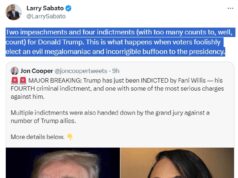By former Virginia House Democratic Leader David Toscano
The nation began 2020 focused on the impeachment of the President and the possible impact it might have on the fall election. We learned much about the Russian meddling in our 2016 contest on behalf of Donald Trump, and many worried that insufficient safeguards had been put into place to prevent its reoccurrence. Then came COVID, which prompted policy makers to reexamine our election process from the angle of public safety. In addition to the prospect of Putin attempting to again disrupt our elections, we now have other issues about which to worry. Many of these battles will be fought in the individual states and will undoubtedly focus on state law and how it is interpreted in state courts. The stakes are high; not only is the Presidency, all congressional seats, and one-third of the U.S. Senate up for election, but contests are being held to determine the composition of 86 out of 99 state legislative chambers. This is significant; with minor exceptions, the party that controls the state legislatures in 2021 will operate the redistricting process that will occur next year. Legislatures will determine the lines for future congressional districts and state legislative contests. With that tool, they have the power to control not just state government but the House of Representatives as well. If Americans have not learned during the COVID pandemic that States matter, they are about to find out.
Fights in state courts could play a role
When Trump first suggested the idea of delaying the election, many were dismayed, even as they recognized that he had no power to do so. But the threat of electoral chaos is not likely to come from the possible delay of the election, but instead from a series of lawsuits that could be filed before and after November 3rd. Trump and his allies have signaled this possibility for weeks, suggesting that the only way he can lose is if the election is “rigged”. He has disrupted the operation of the postal service and suggested that mail-in voting creates rampant fraud.
Remember the 2000 presidential election and how one lawsuit in one state interpreting one state’s election law determined the Presidential contest? None of us will forget Bush v. Gore and the nation waiting more than a month until the U.S. Supreme Court intervened and, in a 5-4 decision, essentially made George W. Bush the President. Now, imagine not one but multiple lawsuits contesting countless ballots in swing states across the nation. It could happen! Election processes in several states have already been challenged. In Wisconsin’s April primary election, the state’s Supreme Court ruled against Governor Evers’s effort to delay the election and the U.S. Supreme Court then changed the dates for the acceptance of absentee ballots. Similarly, thousands of mail-in ballots in the Florida, Pennsylvania, and Nevada arrived too late to be counted. And Georgia’s June contest saw long lines, a product of technical glitches and fewer polling locations. Disputes continue about whether the pandemic is a legitimate legal excuse to vote absentee and whether localities have authority to install voting boxes, all of which can serve as the basis for litigation this November.
In June, the Trump reelection campaign sued state and county officials in Pennsylvania, arguing that mail ballot drop boxes were unconstitutionally deployed in the primary and asking a federal court to bar them in November. After Nevada passed measures in late July to make voting easier, Trump allies sued to challenge the new law. Both the Republican and Democratic parties are gearing up for litigation in the event the election is close.
Many of these suits will commence in state courts, and the results are difficult to predict. Each state has its own set of laws—for when and whether to count absentee votes, how to handle provisional ballots, the extent to which polls will remain open if people want to vote, the location of voting precincts, and even the role of the state legislature in possibly determining the federal electors to choose the President. Take, for example, state laws for the counting of absentee ballots. Thirty-two states presently do not accept absentee ballots received after election day, even if they are postmarked weeks in advance. And we know what happens if the mail is disrupted. In 2018, for example, over 7,700 mail-in ballots in South Florida counties were rejected because they arrived after the state’s Election Day deadline. According to a recent analysis by NPR, more than 550,000 mail-in ballots nationwide have been rejected in this year’s presidential primaries.
While few know precisely how the pandemic will affect voting patterns, most observers expect an avalanche of mail-in votes, and those will be the ones most likely to be challenged. Swing states that allow mail-in voting include Arizona, Florida, Wisconsin, Pennsylvania, Michigan, Ohio and Georgia. These states have a total of 111 electoral votes, certainly enough to decide the Presidential election. To make it more complicated, four of those states — Florida, Pennsylvania, Michigan, and Wisconsin–have state laws that prevent acceptance of mail-in ballots if received after election day, even if postmarked weeks in advance. And, in all but Florida, these states cannot begin processing, much less count, absentee ballots until Election Day. The election could hinge on these four states, and the prospects for litigation in each is high.
Who can predict what might happen if the litigation continues into late December or early January? Would Republican-controlled state legislatures attempt to invoke Article II of U.S. Constitution, which arguably grants them the power to appoint presidential electors, something that has not been exercised since the 1800s and which would effectively negate the popular vote of the state’s electorate? These electors, appointed under state law, could then cast their votes for the President. Whether the GOP would risk the public outcry that would come from such an action is not clear.
Though the scenario of legislatures seizing control of the presidential electors seems highly unlikely, the danger is most acute in states where both legislative chambers and the Governorship are controlled by the same party, what some call the “trifecta.” The GOP has a trifecta in the key states of Arizona, Florida, Ohio, and Georgia. In three others — Michigan, Pennsylvania, and Wisconsin – both houses of the legislature are controlled by Republicans.
State Legislatures are also at stake
More is at stake in this election than simply who will be elected president. Elections are being held for House and Senate seats in 42 states, and the results may flip control of state assemblies from one party to another, just prior to the next redistricting. Many recall the 2010 midterm elections, when the Republicans decimated the Democrats and captured control of the Congress. What few remember, however, is how these midterms affected state legislatures. Prior to the 2010 election, Democrats held the majority of seats in 60 of 99 legislative chambers nationwide, and controlled both chambers in 27 states. After the election, the balance had totally flipped, and Republicans had the majority in 59 chambers and held both chambers in 26 states. This allowed the the GOP to control the decennial redistricting process by drawing districts to cement their majorities and creating new congressional districts favoring their party for the next decade. Hence, 2020 is not simply about the next four years, but the next 10. States matter, and this election will determine much about who will control them.
It is clear that the Trump strategy is to undermine faith in the election, thereby depressing turnout, and then mount legal contests in selective states to create chaos in the counting of the ballots. The only way this can be foiled is by a decisive turnout in November, where there is no doubt about who has carried the states necessary to win the Presidency. That is why efforts are underway in most states to get citizens to cast their votes as early as possible, thereby limiting the risks that some votes will not be counted because they arrive too late. Some states, most notably Virginia, have anticipated the challenges and have acted to make voting easier. Attorney General Mark Herring recently obtained a federal court order protecting the ability of Virginians to have their mail-in votes counted, and the General Assembly just enacted measures permitting localities to install ballot drop boxes and funds to provide prepaid postage for mail-in ballots.
The 2020 election is the most significant in over a century. And how states conduct the counting of votes will largely determine not just the results, but how soon we will get them and the extent to which they will embraced by the American people. To make sure my vote is counted, I will vote absentee in person, a process which starts next week. The next two months will say much about our institutions and whether they can withstand the most significant challenge we have seen to democracy in our lifetimes.










![[UPDATED 1/29/26] Audio: Sen. Tim Kaine Talks to Blue Virginia About His “Five-Point Plan” to Fight Trump’s Orban-Like Assault on US Democracy; Civil Disobedience a la MLK Jr.; Trump’s Bogus “Energy Emergency”; the Crucial Importance of the 2025 VA Elections; etc.](https://bluevirginia.us/wp-content/uploads/2025/02/kaineinterview2-100x75.jpg)
